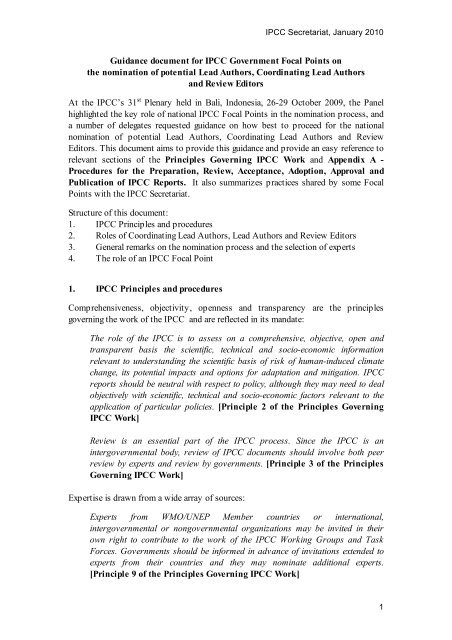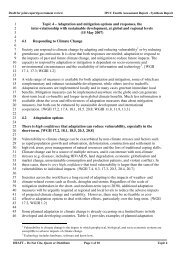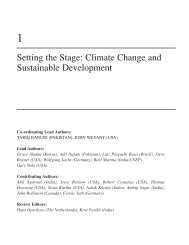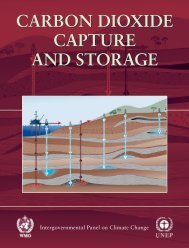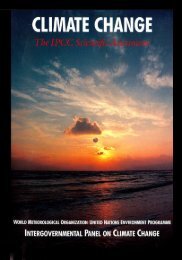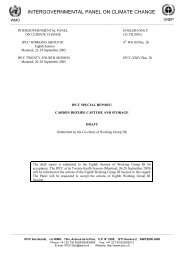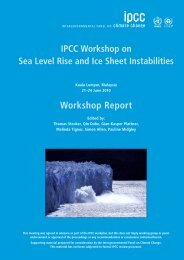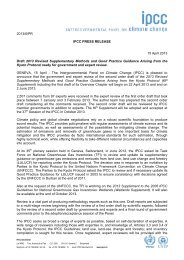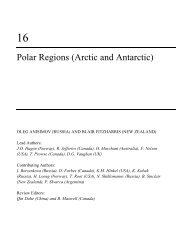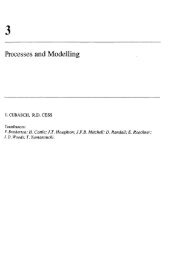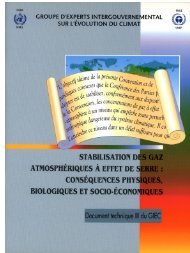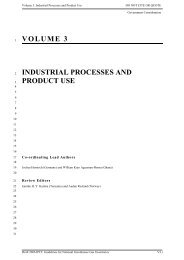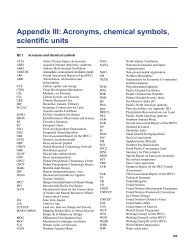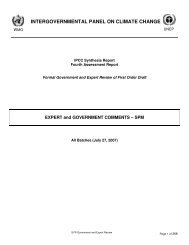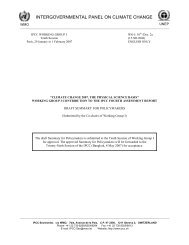Guidance document for IPCC Government Focal Points on the ...
Guidance document for IPCC Government Focal Points on the ...
Guidance document for IPCC Government Focal Points on the ...
Create successful ePaper yourself
Turn your PDF publications into a flip-book with our unique Google optimized e-Paper software.
<str<strong>on</strong>g>IPCC</str<strong>on</strong>g> Secretariat, January 2010<br />
<str<strong>on</strong>g>Guidance</str<strong>on</strong>g> <str<strong>on</strong>g>document</str<strong>on</strong>g> <str<strong>on</strong>g>for</str<strong>on</strong>g> <str<strong>on</strong>g>IPCC</str<strong>on</strong>g> <str<strong>on</strong>g>Government</str<strong>on</strong>g> <str<strong>on</strong>g>Focal</str<strong>on</strong>g> <str<strong>on</strong>g>Points</str<strong>on</strong>g> <strong>on</strong><br />
<strong>the</strong> nominati<strong>on</strong> of potential Lead Authors, Coordinating Lead Authors<br />
and Review Editors<br />
At <strong>the</strong> <str<strong>on</strong>g>IPCC</str<strong>on</strong>g>’s 31 st Plenary held in Bali, Ind<strong>on</strong>esia, 26-29 October 2009, <strong>the</strong> Panel<br />
highlighted <strong>the</strong> key role of nati<strong>on</strong>al <str<strong>on</strong>g>IPCC</str<strong>on</strong>g> <str<strong>on</strong>g>Focal</str<strong>on</strong>g> <str<strong>on</strong>g>Points</str<strong>on</strong>g> in <strong>the</strong> nominati<strong>on</strong> process, and<br />
a number of delegates requested guidance <strong>on</strong> how best to proceed <str<strong>on</strong>g>for</str<strong>on</strong>g> <strong>the</strong> nati<strong>on</strong>al<br />
nominati<strong>on</strong> of potential Lead Authors, Coordinating Lead Authors and Review<br />
Editors. This <str<strong>on</strong>g>document</str<strong>on</strong>g> aims to provide this guidance and provide an easy reference to<br />
relevant secti<strong>on</strong>s of <strong>the</strong> Principles Governing <str<strong>on</strong>g>IPCC</str<strong>on</strong>g> Work and Appendix A -<br />
Procedures <str<strong>on</strong>g>for</str<strong>on</strong>g> <strong>the</strong> Preparati<strong>on</strong>, Review, Acceptance, Adopti<strong>on</strong>, Approval and<br />
Publicati<strong>on</strong> of <str<strong>on</strong>g>IPCC</str<strong>on</strong>g> Reports. It also summarizes practices shared by some <str<strong>on</strong>g>Focal</str<strong>on</strong>g><br />
<str<strong>on</strong>g>Points</str<strong>on</strong>g> with <strong>the</strong> <str<strong>on</strong>g>IPCC</str<strong>on</strong>g> Secretariat.<br />
Structure of this <str<strong>on</strong>g>document</str<strong>on</strong>g>:<br />
1. <str<strong>on</strong>g>IPCC</str<strong>on</strong>g> Principles and procedures<br />
2. Roles of Coordinating Lead Authors, Lead Authors and Review Editors<br />
3. General remarks <strong>on</strong> <strong>the</strong> nominati<strong>on</strong> process and <strong>the</strong> selecti<strong>on</strong> of experts<br />
4. The role of an <str<strong>on</strong>g>IPCC</str<strong>on</strong>g> <str<strong>on</strong>g>Focal</str<strong>on</strong>g> Point<br />
1. <str<strong>on</strong>g>IPCC</str<strong>on</strong>g> Principles and procedures<br />
Comprehensiveness, objectivity, openness and transparency are <strong>the</strong> principles<br />
governing <strong>the</strong> work of <strong>the</strong> <str<strong>on</strong>g>IPCC</str<strong>on</strong>g> and are reflected in its mandate:<br />
The role of <strong>the</strong> <str<strong>on</strong>g>IPCC</str<strong>on</strong>g> is to assess <strong>on</strong> a comprehensive, objective, open and<br />
transparent basis <strong>the</strong> scientific, technical and socio-ec<strong>on</strong>omic in<str<strong>on</strong>g>for</str<strong>on</strong>g>mati<strong>on</strong><br />
relevant to understanding <strong>the</strong> scientific basis of risk of human-induced climate<br />
change, its potential impacts and opti<strong>on</strong>s <str<strong>on</strong>g>for</str<strong>on</strong>g> adaptati<strong>on</strong> and mitigati<strong>on</strong>. <str<strong>on</strong>g>IPCC</str<strong>on</strong>g><br />
reports should be neutral with respect to policy, although <strong>the</strong>y may need to deal<br />
objectively with scientific, technical and socio-ec<strong>on</strong>omic factors relevant to <strong>the</strong><br />
applicati<strong>on</strong> of particular policies. [Principle 2 of <strong>the</strong> Principles Governing<br />
<str<strong>on</strong>g>IPCC</str<strong>on</strong>g> Work]<br />
Review is an essential part of <strong>the</strong> <str<strong>on</strong>g>IPCC</str<strong>on</strong>g> process. Since <strong>the</strong> <str<strong>on</strong>g>IPCC</str<strong>on</strong>g> is an<br />
intergovernmental body, review of <str<strong>on</strong>g>IPCC</str<strong>on</strong>g> <str<strong>on</strong>g>document</str<strong>on</strong>g>s should involve both peer<br />
review by experts and review by governments. [Principle 3 of <strong>the</strong> Principles<br />
Governing <str<strong>on</strong>g>IPCC</str<strong>on</strong>g> Work]<br />
Expertise is drawn from a wide array of sources:<br />
Experts from WMO/UNEP Member countries or internati<strong>on</strong>al,<br />
intergovernmental or n<strong>on</strong>governmental organizati<strong>on</strong>s may be invited in <strong>the</strong>ir<br />
own right to c<strong>on</strong>tribute to <strong>the</strong> work of <strong>the</strong> <str<strong>on</strong>g>IPCC</str<strong>on</strong>g> Working Groups and Task<br />
Forces. <str<strong>on</strong>g>Government</str<strong>on</strong>g>s should be in<str<strong>on</strong>g>for</str<strong>on</strong>g>med in advance of invitati<strong>on</strong>s extended to<br />
experts from <strong>the</strong>ir countries and <strong>the</strong>y may nominate additi<strong>on</strong>al experts.<br />
[Principle 9 of <strong>the</strong> Principles Governing <str<strong>on</strong>g>IPCC</str<strong>on</strong>g> Work]<br />
1
<str<strong>on</strong>g>IPCC</str<strong>on</strong>g> Secretariat, January 2010<br />
The <str<strong>on</strong>g>IPCC</str<strong>on</strong>g> prepares three types of materials including <str<strong>on</strong>g>IPCC</str<strong>on</strong>g> Reports (Assessment<br />
Reports, Special Reports, and Methodology Reports, including <strong>the</strong>ir Syn<strong>the</strong>sis<br />
Report, Summaries <str<strong>on</strong>g>for</str<strong>on</strong>g> Policymakers or overview chapters respectively), Technical<br />
Papers, and Supporting Material (reports and proceedings from workshops and<br />
expert meetings and o<strong>the</strong>r material commissi<strong>on</strong>ed by <strong>the</strong> <str<strong>on</strong>g>IPCC</str<strong>on</strong>g>).<br />
All <str<strong>on</strong>g>IPCC</str<strong>on</strong>g> Reports are prepared by teams of authors and reviewed comprehensively<br />
by experts and governments in a multi-stage review process:<br />
The review process generally takes place in three stages: expert review of <str<strong>on</strong>g>IPCC</str<strong>on</strong>g><br />
Reports, government/expert review of <str<strong>on</strong>g>IPCC</str<strong>on</strong>g> Reports, government review of <strong>the</strong><br />
Summaries <str<strong>on</strong>g>for</str<strong>on</strong>g> Policymakers, Overview Chapters and/or <strong>the</strong> Syn<strong>the</strong>sis Report.<br />
Working Group/Task Force Bureau Co-Chairs should aim to avoid (or at least<br />
minimise) <strong>the</strong> overlap of government review periods <str<strong>on</strong>g>for</str<strong>on</strong>g> different <str<strong>on</strong>g>IPCC</str<strong>on</strong>g> Reports<br />
and with Sessi<strong>on</strong>s of <strong>the</strong> C<strong>on</strong>ference of Parties of <strong>the</strong> United Nati<strong>on</strong>s Framework<br />
C<strong>on</strong>venti<strong>on</strong> of Climate Change and its subsidiary bodies. Expert review should<br />
normally be eight weeks, but not less than six weeks, except to <strong>the</strong> extent decided<br />
by <strong>the</strong> Panel. <str<strong>on</strong>g>Government</str<strong>on</strong>g> and government/expert reviews should not be less<br />
than eight weeks, except to <strong>the</strong> extent decided by <strong>the</strong> Panel. All written expert, and<br />
government review comments will be made available to reviewers <strong>on</strong> request<br />
during <strong>the</strong> review process and will be retained in an open archive in a locati<strong>on</strong><br />
determined by <strong>the</strong> <str<strong>on</strong>g>IPCC</str<strong>on</strong>g> Secretariat <strong>on</strong> completi<strong>on</strong> of <strong>the</strong> Report <str<strong>on</strong>g>for</str<strong>on</strong>g> a period of<br />
at least five years. [Appendix A to <strong>the</strong> Principles Governing <str<strong>on</strong>g>IPCC</str<strong>on</strong>g> Work,<br />
4.1]<br />
In order to support <strong>the</strong> assessment process <strong>the</strong> <str<strong>on</strong>g>IPCC</str<strong>on</strong>g> holds workshops and expert<br />
meetings that have been agreed up<strong>on</strong> in advance by an <str<strong>on</strong>g>IPCC</str<strong>on</strong>g> Working Group, or by<br />
<strong>the</strong> Panel as useful or necessary <str<strong>on</strong>g>for</str<strong>on</strong>g> <strong>the</strong> completi<strong>on</strong> of <strong>the</strong> work plan of a Working<br />
Group or a task of <strong>the</strong> <str<strong>on</strong>g>IPCC</str<strong>on</strong>g>. The experts invited to <strong>the</strong>se meetings are ei<strong>the</strong>r selected<br />
by <strong>the</strong> respective Working Group Bureau or Task Force Bureau, or by <strong>the</strong> scientific<br />
steering group of <strong>the</strong> meeting, often following a nominati<strong>on</strong> process involving <str<strong>on</strong>g>IPCC</str<strong>on</strong>g><br />
Member countries and observer organizati<strong>on</strong>s.<br />
2. Role of Coordinating Lead Authors, Lead Authors, and Review Editors<br />
For a complete descripti<strong>on</strong> of <strong>the</strong> roles and resp<strong>on</strong>sibilities of Coordinating Lead<br />
Authors, Lead Authors and Review Editors, as well as those of c<strong>on</strong>tributing authors<br />
and expert reviewers, please see Annex 1 of Appendix A to <strong>the</strong> Principles Governing<br />
<str<strong>on</strong>g>IPCC</str<strong>on</strong>g> Work. In summary, <strong>the</strong> Coordinating Lead Authors and Lead Authors are<br />
resp<strong>on</strong>sible <str<strong>on</strong>g>for</str<strong>on</strong>g> drafting <strong>the</strong> chapters and revising <strong>the</strong>m taking into account comments<br />
submitted by expert reviewers during <strong>the</strong> two <str<strong>on</strong>g>IPCC</str<strong>on</strong>g>-mandated reviews, namely <strong>the</strong><br />
expert review and <strong>the</strong> sec<strong>on</strong>d review by governments and experts. The process of<br />
revisi<strong>on</strong> and redrafting is overseen by <strong>the</strong> Review Editors. A representative crosssecti<strong>on</strong><br />
of authors will also c<strong>on</strong>tribute to drafting, revising and finalising <strong>the</strong> Technical<br />
Summary and Summary <str<strong>on</strong>g>for</str<strong>on</strong>g> Policymakers (SPM).<br />
Specifically, <strong>the</strong> role of Lead Authors (LAs) is:<br />
2
<str<strong>on</strong>g>IPCC</str<strong>on</strong>g> Secretariat, January 2010<br />
To be resp<strong>on</strong>sible <str<strong>on</strong>g>for</str<strong>on</strong>g> <strong>the</strong> producti<strong>on</strong> of designated secti<strong>on</strong>s addressing items of<br />
<strong>the</strong> work programme <strong>on</strong> <strong>the</strong> basis of <strong>the</strong> best scientific, technical and socioec<strong>on</strong>omic<br />
in<str<strong>on</strong>g>for</str<strong>on</strong>g>mati<strong>on</strong> available. [Appendix A to <strong>the</strong> Principles Governing<br />
<str<strong>on</strong>g>IPCC</str<strong>on</strong>g> Work, Annex 1, 1.]<br />
The role of <strong>the</strong> Coordinating Lead Authors’ (CLAs) is:<br />
To take overall resp<strong>on</strong>sibility <str<strong>on</strong>g>for</str<strong>on</strong>g> coordinating major secti<strong>on</strong>s of a Report.<br />
[Appendix A to <strong>the</strong> Principles Governing <str<strong>on</strong>g>IPCC</str<strong>on</strong>g> Work, Annex 1, 2.]<br />
The task of <strong>the</strong> Coordinating Lead Authors and Lead Authors is a demanding <strong>on</strong>e.<br />
During <strong>the</strong> period of preparati<strong>on</strong> of <strong>the</strong> Reports <strong>the</strong> workload will be in <strong>the</strong> order of<br />
several m<strong>on</strong>ths and can be particularly heavy during certain periods. It is expected that<br />
Coordinating Lead Authors and Lead Authors would need to attend four Lead<br />
Authors meetings and possibly additi<strong>on</strong>al chapter meetings. In additi<strong>on</strong>, <strong>the</strong> presence<br />
of Coordinating Lead Authors and selected Lead Authors may be requested at<br />
sessi<strong>on</strong>s of <strong>the</strong> <str<strong>on</strong>g>IPCC</str<strong>on</strong>g> and its Working Groups to assist in finalizing <strong>the</strong> Summary <str<strong>on</strong>g>for</str<strong>on</strong>g><br />
Policymakers and/or Working Group c<strong>on</strong>tributi<strong>on</strong> to <strong>the</strong> Report.<br />
The role of Review Editors (REs) is to:<br />
Assist <strong>the</strong> Working Group/Task Force Bureaux in identifying reviewers <str<strong>on</strong>g>for</str<strong>on</strong>g> <strong>the</strong><br />
expert review process, ensure that all substantive expert and government review<br />
comments are af<str<strong>on</strong>g>for</str<strong>on</strong>g>ded appropriate c<strong>on</strong>siderati<strong>on</strong>, advise lead authors <strong>on</strong> how<br />
to handle c<strong>on</strong>tentious/c<strong>on</strong>troversial issues and ensure genuine c<strong>on</strong>troversies are<br />
reflected adequately in <strong>the</strong> text of <strong>the</strong> Report. [Appendix A to <strong>the</strong> Principles<br />
Governing <str<strong>on</strong>g>IPCC</str<strong>on</strong>g> Work, Annex 1, 5.]<br />
3. The nominati<strong>on</strong> process and <strong>the</strong> selecti<strong>on</strong> of experts by <strong>the</strong> <str<strong>on</strong>g>IPCC</str<strong>on</strong>g><br />
The <str<strong>on</strong>g>IPCC</str<strong>on</strong>g> aims to select <strong>the</strong> best available scientific experts representing a range of<br />
disciplines, views and geographical balance:<br />
The compositi<strong>on</strong> of <strong>the</strong> group of Coordinating Lead Authors and Lead Authors<br />
<str<strong>on</strong>g>for</str<strong>on</strong>g> a secti<strong>on</strong> or chapter of a Report shall reflect <strong>the</strong> need to aim <str<strong>on</strong>g>for</str<strong>on</strong>g> a range of<br />
views, expertise and geographical representati<strong>on</strong> (ensuring appropriate<br />
representati<strong>on</strong> of experts from developing and developed countries and<br />
countries with ec<strong>on</strong>omies in transiti<strong>on</strong>). There should be at least <strong>on</strong>e and<br />
normally two or more from developing countries. [Appendix A to <strong>the</strong><br />
Principles Governing <str<strong>on</strong>g>IPCC</str<strong>on</strong>g> Work, 4.2.2]<br />
Scientific experts c<strong>on</strong>tributing to <strong>the</strong> <str<strong>on</strong>g>IPCC</str<strong>on</strong>g> process are proposed by <strong>the</strong> governments<br />
of <str<strong>on</strong>g>IPCC</str<strong>on</strong>g> Member countries and organizati<strong>on</strong>s, including UN and o<strong>the</strong>r internati<strong>on</strong>al,<br />
intergovernmental and n<strong>on</strong>-governmental organizati<strong>on</strong>s. The <str<strong>on</strong>g>IPCC</str<strong>on</strong>g> at its 25 th Sessi<strong>on</strong><br />
has adopted an “<str<strong>on</strong>g>IPCC</str<strong>on</strong>g> Policy and Process <str<strong>on</strong>g>for</str<strong>on</strong>g> Admitting Observer<br />
Organizati<strong>on</strong>s”.<br />
3
<str<strong>on</strong>g>IPCC</str<strong>on</strong>g> Secretariat, January 2010<br />
The Bureaux of Working Groups I, II and III guide this process and help identify<br />
experts <str<strong>on</strong>g>for</str<strong>on</strong>g> specific secti<strong>on</strong>s and chapters:<br />
At <strong>the</strong> request of Working Group Bureau Co-Chairs through <strong>the</strong>ir respective<br />
Working Group Bureau, and <strong>the</strong> <str<strong>on</strong>g>IPCC</str<strong>on</strong>g> Secretariat, governments, and<br />
participating organisati<strong>on</strong>s and <strong>the</strong> Working Group Bureaux should identify<br />
appropriate experts <str<strong>on</strong>g>for</str<strong>on</strong>g> each area in <strong>the</strong> Report who can act as potential<br />
Coordinating Lead Authors, Lead Authors, C<strong>on</strong>tributing Authors, expert<br />
reviewers or Review Editors. To facilitate <strong>the</strong> identificati<strong>on</strong> of experts and later<br />
review by governments, governments should also designate <strong>the</strong>ir respective<br />
<str<strong>on</strong>g>Focal</str<strong>on</strong>g> <str<strong>on</strong>g>Points</str<strong>on</strong>g>. <str<strong>on</strong>g>IPCC</str<strong>on</strong>g> Bureau Members and Members of <strong>the</strong> Task Force Bureau<br />
should c<strong>on</strong>tribute where necessary to identifying appropriate Coordinating Lead<br />
Authors, Lead Authors, C<strong>on</strong>tributing Authors, expert reviewers, and Review<br />
Editors in cooperati<strong>on</strong> with <strong>the</strong> <str<strong>on</strong>g>Government</str<strong>on</strong>g> <str<strong>on</strong>g>Focal</str<strong>on</strong>g> <str<strong>on</strong>g>Points</str<strong>on</strong>g> within <strong>the</strong>ir regi<strong>on</strong> to<br />
ensure an appropriate representati<strong>on</strong> of experts from developing and developed<br />
countries and countries with ec<strong>on</strong>omies in transiti<strong>on</strong>. These should be assembled<br />
into lists available to all <str<strong>on</strong>g>IPCC</str<strong>on</strong>g> Members and maintained by <strong>the</strong> <str<strong>on</strong>g>IPCC</str<strong>on</strong>g><br />
Secretariat. [Appendix A to <strong>the</strong> Principles Governing <str<strong>on</strong>g>IPCC</str<strong>on</strong>g> Work, 4.2.1]<br />
The Working Group Bureaux select as Coordinating Lead Authors and Lead Authors<br />
experts cited in <strong>the</strong> nominati<strong>on</strong> lists and o<strong>the</strong>r experts known through <strong>the</strong>ir scientific<br />
work. C<strong>on</strong>tributing Authors are identified by <strong>the</strong> Coordinating Lead Authors and Lead<br />
Authors as needed:<br />
Coordinating Lead Authors and Lead Authors are selected by <strong>the</strong> relevant<br />
Working Group Bureau, under general guidance and review provided by <strong>the</strong><br />
Sessi<strong>on</strong> of <strong>the</strong> Working Group (…) from those experts cited in <strong>the</strong> lists provided<br />
by governments and participating organisati<strong>on</strong>s, and o<strong>the</strong>r experts as<br />
appropriate, known through <strong>the</strong>ir publicati<strong>on</strong>s and works. (…) The<br />
Coordinating Lead Authors and Lead Authors selected by <strong>the</strong> Working Group<br />
Bureau may enlist o<strong>the</strong>r experts as C<strong>on</strong>tributing Authors to assist with <strong>the</strong> work.<br />
At <strong>the</strong> earliest opportunity, <strong>the</strong> <str<strong>on</strong>g>IPCC</str<strong>on</strong>g> Secretariat should in<str<strong>on</strong>g>for</str<strong>on</strong>g>m all governments<br />
and participating organisati<strong>on</strong>s who <strong>the</strong> Coordinating Lead Authors and Lead<br />
Authors are <str<strong>on</strong>g>for</str<strong>on</strong>g> different chapters and indicate <strong>the</strong> general c<strong>on</strong>tent area that <strong>the</strong><br />
pers<strong>on</strong> will c<strong>on</strong>tribute to <strong>the</strong> chapter. [Appendix A to <strong>the</strong> Principles<br />
Governing <str<strong>on</strong>g>IPCC</str<strong>on</strong>g> Work, 4.2.2]<br />
The Review Editors are also selected by <strong>the</strong> Working Group Bureaux:<br />
To help ensure that Reports provide a balanced and complete assessment of<br />
current in<str<strong>on</strong>g>for</str<strong>on</strong>g>mati<strong>on</strong>, each Working Group Bureau should normally select two<br />
Review Editors per chapter (including <strong>the</strong> executive summaries) and per<br />
technical summary of each Report.<br />
Review Editors should normally c<strong>on</strong>sist of a member of <strong>the</strong> Working Group<br />
Bureau, and an independent expert based <strong>on</strong> <strong>the</strong> lists provided by governments<br />
4
<str<strong>on</strong>g>IPCC</str<strong>on</strong>g> Secretariat, January 2010<br />
and participating organisati<strong>on</strong>s. (…) In selecting Review Editors, <strong>the</strong> Bureaux<br />
should select from developed and developing countries and from countries with<br />
ec<strong>on</strong>omies in transiti<strong>on</strong>, and should aim <str<strong>on</strong>g>for</str<strong>on</strong>g> a balanced representati<strong>on</strong> of<br />
scientific, technical and socio-ec<strong>on</strong>omic views. [Appendix A to <strong>the</strong> Principles<br />
Governing <str<strong>on</strong>g>IPCC</str<strong>on</strong>g> Work, 4.2.4]<br />
The selecti<strong>on</strong> of expert reviewers should aim <str<strong>on</strong>g>for</str<strong>on</strong>g> a range of views, expertise and<br />
geographical representati<strong>on</strong>.<br />
The review circulati<strong>on</strong> should include:<br />
• Experts who have significant expertise and/or publicati<strong>on</strong>s in particular areas<br />
covered by <strong>the</strong> Report.<br />
• Experts nominated by governments as Coordinating Lead Authors, Lead<br />
Authors, c<strong>on</strong>tributing authors or expert reviewers as included in lists<br />
maintained by <strong>the</strong> <str<strong>on</strong>g>IPCC</str<strong>on</strong>g> Secretariat.<br />
• Expert reviewers nominated by appropriate organisati<strong>on</strong>s. [Appendix A to<br />
<strong>the</strong> Principles Governing <str<strong>on</strong>g>IPCC</str<strong>on</strong>g> Work, 4.2.4.1]<br />
4. The role of an <str<strong>on</strong>g>IPCC</str<strong>on</strong>g> <str<strong>on</strong>g>Focal</str<strong>on</strong>g> Point<br />
Many of <strong>the</strong> <str<strong>on</strong>g>IPCC</str<strong>on</strong>g> Member countries have a designated <str<strong>on</strong>g>Focal</str<strong>on</strong>g> Point who links <strong>the</strong><br />
government with <strong>the</strong> nati<strong>on</strong>al scientific community and <strong>the</strong> <str<strong>on</strong>g>IPCC</str<strong>on</strong>g>. If no <str<strong>on</strong>g>Focal</str<strong>on</strong>g> Point is<br />
designated, communicati<strong>on</strong> from <strong>the</strong> <str<strong>on</strong>g>IPCC</str<strong>on</strong>g> is sent to <strong>the</strong> Ministries <str<strong>on</strong>g>for</str<strong>on</strong>g> Foreign<br />
Affairs, through <strong>the</strong> respective Permanent Missi<strong>on</strong> in Geneva, Switzerland, <strong>the</strong> host<br />
country of <strong>the</strong> <str<strong>on</strong>g>IPCC</str<strong>on</strong>g> Secretariat. As an intergovernmental organizati<strong>on</strong>, <strong>the</strong> <str<strong>on</strong>g>IPCC</str<strong>on</strong>g><br />
sends copies of all communicati<strong>on</strong> to <strong>the</strong> Ministries <str<strong>on</strong>g>for</str<strong>on</strong>g> Foreign Affairs.<br />
The locati<strong>on</strong> and staffing of <strong>the</strong> <str<strong>on</strong>g>IPCC</str<strong>on</strong>g> <str<strong>on</strong>g>Focal</str<strong>on</strong>g> <str<strong>on</strong>g>Points</str<strong>on</strong>g> differ depending <strong>on</strong> nati<strong>on</strong>al<br />
circumstances. Some countries have established a staffed ‘nati<strong>on</strong>al coordinati<strong>on</strong> office’<br />
that supports <strong>the</strong> work of <strong>the</strong> <str<strong>on</strong>g>Focal</str<strong>on</strong>g> Point. In o<strong>the</strong>r countries, <strong>the</strong> <str<strong>on</strong>g>IPCC</str<strong>on</strong>g> <str<strong>on</strong>g>Focal</str<strong>on</strong>g> Point,<br />
toge<strong>the</strong>r with representatives from nati<strong>on</strong>al and regi<strong>on</strong>al governments and academic<br />
instituti<strong>on</strong>s, is a member of a ‘nati<strong>on</strong>al commissi<strong>on</strong> <strong>on</strong> climate change’ or ano<strong>the</strong>r<br />
nati<strong>on</strong>al or regi<strong>on</strong>al coordinati<strong>on</strong> entity that deals with science and policy issues<br />
related to climate change. These commissi<strong>on</strong>s and networks can play a crucial role in<br />
identifying experts <str<strong>on</strong>g>for</str<strong>on</strong>g> <strong>the</strong> <str<strong>on</strong>g>IPCC</str<strong>on</strong>g>. In cases where such networks do not exist, <str<strong>on</strong>g>Focal</str<strong>on</strong>g><br />
<str<strong>on</strong>g>Points</str<strong>on</strong>g> are encouraged to c<strong>on</strong>tact nati<strong>on</strong>al research communities and instituti<strong>on</strong>s in<br />
order to identify relevant experts.<br />
According to <strong>the</strong> Principles Governing <str<strong>on</strong>g>IPCC</str<strong>on</strong>g> Work <strong>the</strong> functi<strong>on</strong> of <strong>the</strong> <str<strong>on</strong>g>Focal</str<strong>on</strong>g> Point is:<br />
To prepare and update <strong>the</strong> list of nati<strong>on</strong>al experts as required to help implement<br />
<strong>the</strong> <str<strong>on</strong>g>IPCC</str<strong>on</strong>g> work programme, and to arrange <strong>the</strong> provisi<strong>on</strong> of integrated<br />
comments <strong>on</strong> <strong>the</strong> accuracy and completeness of <strong>the</strong> scientific and/or technical<br />
c<strong>on</strong>tent and <strong>the</strong> overall scientific and/or technical balance of <strong>the</strong> drafts.<br />
[Appendix A to <strong>the</strong> Principles Governing <str<strong>on</strong>g>IPCC</str<strong>on</strong>g> Work, Annex 1, 6.]<br />
5
<str<strong>on</strong>g>IPCC</str<strong>on</strong>g> Secretariat, January 2010<br />
In most cases, <strong>the</strong> <str<strong>on</strong>g>IPCC</str<strong>on</strong>g> <str<strong>on</strong>g>Focal</str<strong>on</strong>g> Point coordinates <strong>the</strong> nominati<strong>on</strong> process with <strong>the</strong> help<br />
of a ‘nati<strong>on</strong>al coordinati<strong>on</strong> office’ when available, i.e. disseminates <strong>the</strong> <str<strong>on</strong>g>IPCC</str<strong>on</strong>g> call <str<strong>on</strong>g>for</str<strong>on</strong>g><br />
nominati<strong>on</strong>s through <strong>the</strong> established networks and c<strong>on</strong>tacts, helps identify senior<br />
experts <str<strong>on</strong>g>for</str<strong>on</strong>g> specific secti<strong>on</strong>s and chapters of <strong>the</strong> Reports and, often after c<strong>on</strong>sultati<strong>on</strong><br />
with independent experts and internal review, provides a list of names and credentials<br />
to <strong>the</strong> <str<strong>on</strong>g>IPCC</str<strong>on</strong>g> Secretariat and Working Group Bureaux. <str<strong>on</strong>g>Focal</str<strong>on</strong>g> <str<strong>on</strong>g>Points</str<strong>on</strong>g> are also encouraged<br />
to c<strong>on</strong>sult with <strong>the</strong> Members of <strong>the</strong> <str<strong>on</strong>g>IPCC</str<strong>on</strong>g> Bureau from <strong>the</strong>ir regi<strong>on</strong> <strong>on</strong> how to identify<br />
scientific technical instituti<strong>on</strong>s and experts.<br />
Networks and c<strong>on</strong>tacts<br />
In order to facilitate in<str<strong>on</strong>g>for</str<strong>on</strong>g>mati<strong>on</strong> exchange between <strong>the</strong> nati<strong>on</strong>al entities and <strong>the</strong> <str<strong>on</strong>g>IPCC</str<strong>on</strong>g>,<br />
it is recommended that governments, <strong>the</strong>ir <str<strong>on</strong>g>IPCC</str<strong>on</strong>g> <str<strong>on</strong>g>Focal</str<strong>on</strong>g> <str<strong>on</strong>g>Points</str<strong>on</strong>g>, or c<strong>on</strong>tacts resp<strong>on</strong>sible<br />
<str<strong>on</strong>g>for</str<strong>on</strong>g> <str<strong>on</strong>g>IPCC</str<strong>on</strong>g>-related matters establish networks and maintain lists of c<strong>on</strong>tacts of:<br />
• nati<strong>on</strong>al experts including <strong>the</strong>ir scientific expertise, publicati<strong>on</strong> record, and<br />
interest in getting involved in <strong>the</strong> work of <str<strong>on</strong>g>IPCC</str<strong>on</strong>g>;<br />
• key pers<strong>on</strong>s within government, academic, n<strong>on</strong>-governmental and private<br />
sector entities;<br />
• nati<strong>on</strong>al scientists who have been involved in <strong>the</strong> preparati<strong>on</strong> of previous<br />
<str<strong>on</strong>g>IPCC</str<strong>on</strong>g> Reports;<br />
• people who specifically asked to be in<str<strong>on</strong>g>for</str<strong>on</strong>g>med of new <str<strong>on</strong>g>IPCC</str<strong>on</strong>g> calls <str<strong>on</strong>g>for</str<strong>on</strong>g><br />
nominati<strong>on</strong>s.<br />
Disseminati<strong>on</strong> of <strong>the</strong> call <str<strong>on</strong>g>for</str<strong>on</strong>g> nominati<strong>on</strong>s<br />
<str<strong>on</strong>g>Government</str<strong>on</strong>g>s and participating organizati<strong>on</strong>s are free to identify nominees in any<br />
manner. Some countries choose to c<strong>on</strong>sult broadly in identifying potential experts,<br />
soliciting recommendati<strong>on</strong>s from any interested government, academic, n<strong>on</strong>governmental,<br />
or private sector entities. Often, scientists involved in <strong>the</strong> preparati<strong>on</strong><br />
of previous <str<strong>on</strong>g>IPCC</str<strong>on</strong>g> Reports are c<strong>on</strong>sulted.<br />
Depending <strong>on</strong> nati<strong>on</strong>al procedures, a number of channels are used <str<strong>on</strong>g>for</str<strong>on</strong>g> disseminating<br />
<strong>the</strong> call <str<strong>on</strong>g>for</str<strong>on</strong>g> nominati<strong>on</strong>s:<br />
• list-servers <str<strong>on</strong>g>for</str<strong>on</strong>g> electr<strong>on</strong>ic mailings generated from <strong>the</strong> above menti<strong>on</strong>ed c<strong>on</strong>tact<br />
databases;<br />
• o<strong>the</strong>r mailing lists used within government, academic, n<strong>on</strong>-governmental and<br />
private sector entities;<br />
• public advertisement through key web portals or appropriate print and e-<br />
products;<br />
• announcements at relevant meetings, workshops, c<strong>on</strong>ferences.<br />
6
<str<strong>on</strong>g>IPCC</str<strong>on</strong>g> Secretariat, January 2010<br />
Nati<strong>on</strong>al selecti<strong>on</strong> process <str<strong>on</strong>g>for</str<strong>on</strong>g> nominati<strong>on</strong>s<br />
When resp<strong>on</strong>ding to <strong>the</strong> call <str<strong>on</strong>g>for</str<strong>on</strong>g> nominati<strong>on</strong>s, self-nominati<strong>on</strong> is <strong>the</strong> norm in many<br />
countries. However, <strong>the</strong> <str<strong>on</strong>g>IPCC</str<strong>on</strong>g> procedures encourage nominati<strong>on</strong> through mechanisms<br />
established by <strong>the</strong> government, NGOs or Internati<strong>on</strong>al Organizati<strong>on</strong>s. The <str<strong>on</strong>g>IPCC</str<strong>on</strong>g> <str<strong>on</strong>g>Focal</str<strong>on</strong>g><br />
Point should aim to pre-select a roster of candidates that reflects a wide range of<br />
views, disciplines and expertise.<br />
Nominees may be requested by <strong>the</strong>ir nati<strong>on</strong>al <str<strong>on</strong>g>Focal</str<strong>on</strong>g> Point to complete <strong>the</strong> nominati<strong>on</strong><br />
<str<strong>on</strong>g>for</str<strong>on</strong>g>ms provided by <strong>the</strong> <str<strong>on</strong>g>IPCC</str<strong>on</strong>g> Secretariat. In this <str<strong>on</strong>g>for</str<strong>on</strong>g>m, <strong>the</strong> candidate is asked to<br />
indicate <strong>the</strong> working group(s), chapter(s) and author role(s) <str<strong>on</strong>g>for</str<strong>on</strong>g> which he/she is being<br />
nominated. Toge<strong>the</strong>r with a summary curriculum vita in English specifying <strong>the</strong><br />
nominee’s expertise and a list of relevant publicati<strong>on</strong>s, <strong>the</strong> nominee returns <strong>the</strong><br />
completed nominati<strong>on</strong> <str<strong>on</strong>g>for</str<strong>on</strong>g>m to <strong>the</strong> nati<strong>on</strong>al <str<strong>on</strong>g>IPCC</str<strong>on</strong>g> <str<strong>on</strong>g>Focal</str<strong>on</strong>g> Point (or ‘nati<strong>on</strong>al<br />
coordinati<strong>on</strong> office’ or ‘nati<strong>on</strong>al commissi<strong>on</strong> <strong>on</strong> climate change’) <str<strong>on</strong>g>for</str<strong>on</strong>g> compilati<strong>on</strong> and<br />
submissi<strong>on</strong> to <strong>the</strong> <str<strong>on</strong>g>IPCC</str<strong>on</strong>g>.<br />
Within a country, a small committee of government experts may review and verify <strong>the</strong><br />
credentials of <strong>the</strong> nominati<strong>on</strong>s collected by <strong>the</strong> <str<strong>on</strong>g>Focal</str<strong>on</strong>g> Point. Sometimes, independent<br />
experts from <strong>the</strong> scientific community or both <strong>the</strong> scientific and political communities<br />
are c<strong>on</strong>sulted during this review. Some countries c<strong>on</strong>vene expert panels <str<strong>on</strong>g>for</str<strong>on</strong>g> each<br />
Working Group, composed of representatives from independent nati<strong>on</strong>al agencies that<br />
make recommendati<strong>on</strong>s to <strong>the</strong> government or <strong>the</strong> designated <str<strong>on</strong>g>Focal</str<strong>on</strong>g> Point. The<br />
approved list of nominees is <strong>the</strong>n submitted to <strong>the</strong> <str<strong>on</strong>g>IPCC</str<strong>on</strong>g> Secretariat by <strong>the</strong> <str<strong>on</strong>g>Focal</str<strong>on</strong>g><br />
Point.<br />
Acknowledgement<br />
The <str<strong>on</strong>g>IPCC</str<strong>on</strong>g> Secretariat is grateful to <strong>the</strong> <str<strong>on</strong>g>Focal</str<strong>on</strong>g> <str<strong>on</strong>g>Points</str<strong>on</strong>g> of Belgium, Canada, France,<br />
Germany, Japan, Spain, Switzerland, and <strong>the</strong> United States <str<strong>on</strong>g>for</str<strong>on</strong>g> sharing <strong>the</strong>ir<br />
in<str<strong>on</strong>g>for</str<strong>on</strong>g>mati<strong>on</strong> <strong>on</strong> nati<strong>on</strong>al nominati<strong>on</strong> processes with <strong>the</strong> <str<strong>on</strong>g>IPCC</str<strong>on</strong>g> community in order to<br />
c<strong>on</strong>tribute to this guidance <str<strong>on</strong>g>document</str<strong>on</strong>g>.<br />
References<br />
Principles Governing <str<strong>on</strong>g>IPCC</str<strong>on</strong>g> Work http://www.ipcc.ch/pdf/ipcc-principles/ipccprinciples.pdf<br />
Appendix A of Principles Governing <str<strong>on</strong>g>IPCC</str<strong>on</strong>g> Work http://www.ipcc.ch/pdf/ipccprinciples/ipcc-principles-appendix-a.pdf<br />
7


